Introduction
In the rapidly evolving digital landscape, mobile applications have become an integral part of everyday life, making the need for rigorous mobile app testing more critical than ever. This comprehensive process ensures that apps function seamlessly across a multitude of devices and operating systems, addressing various aspects such as:
- Functionality
- Usability
- Performance
- Security
As the average user engages with their smartphone dozens of times a day, the stakes are high for developers and businesses aiming to deliver flawless user experiences. With a significant portion of users abandoning apps after a single negative encounter, understanding the nuances of mobile app testing is essential for maintaining competitiveness and fostering customer loyalty.
This article delves into the significance of mobile app testing, the different types of applications and their respective testing strategies, the challenges faced in the testing process, and best practices for achieving optimal app performance.
Defining Mobile App Testing: An Overview
The process of mobile apps testing is crucial as it evaluates mobile applications to ensure they perform as intended across a wide range of devices and operating systems. This multifaceted approach includes various testing types such as:
- Mobile apps testing
- Functional testing
- Usability testing
- Performance testing
- Security testing
Mobile apps testing plays a vital role in identifying and resolving potential issues before the app's launch, ultimately ensuring a seamless experience and high performance.
With individuals aged 18 to 24 being the most frequent users of short video apps like TikTok and Instagram, the demand for flawless app functionality is more pressing than ever. Significantly, Global App Testing features a network of over 90,000 evaluators in more than 190 nations, highlighting the scope and significance of application assessment. Implementing mobile apps testing software effectively involves:
- Thorough evaluation across various devices and platforms
- Utilizing automation for efficiency
- Continuously updating assessment processes
This best practice approach helps businesses keep pace with the evolving technology landscape. Moreover, as Shreya Bose indicates, the typical smartphone owner checks their device 47 times daily, emphasizing the importance of application evaluation in fulfilling engagement expectations. Considering the swift growth of application software in the digital marketplace, a thorough comprehension of mobile apps testing methods has become essential for developers and enterprises seeking to succeed in today's competitive environment.
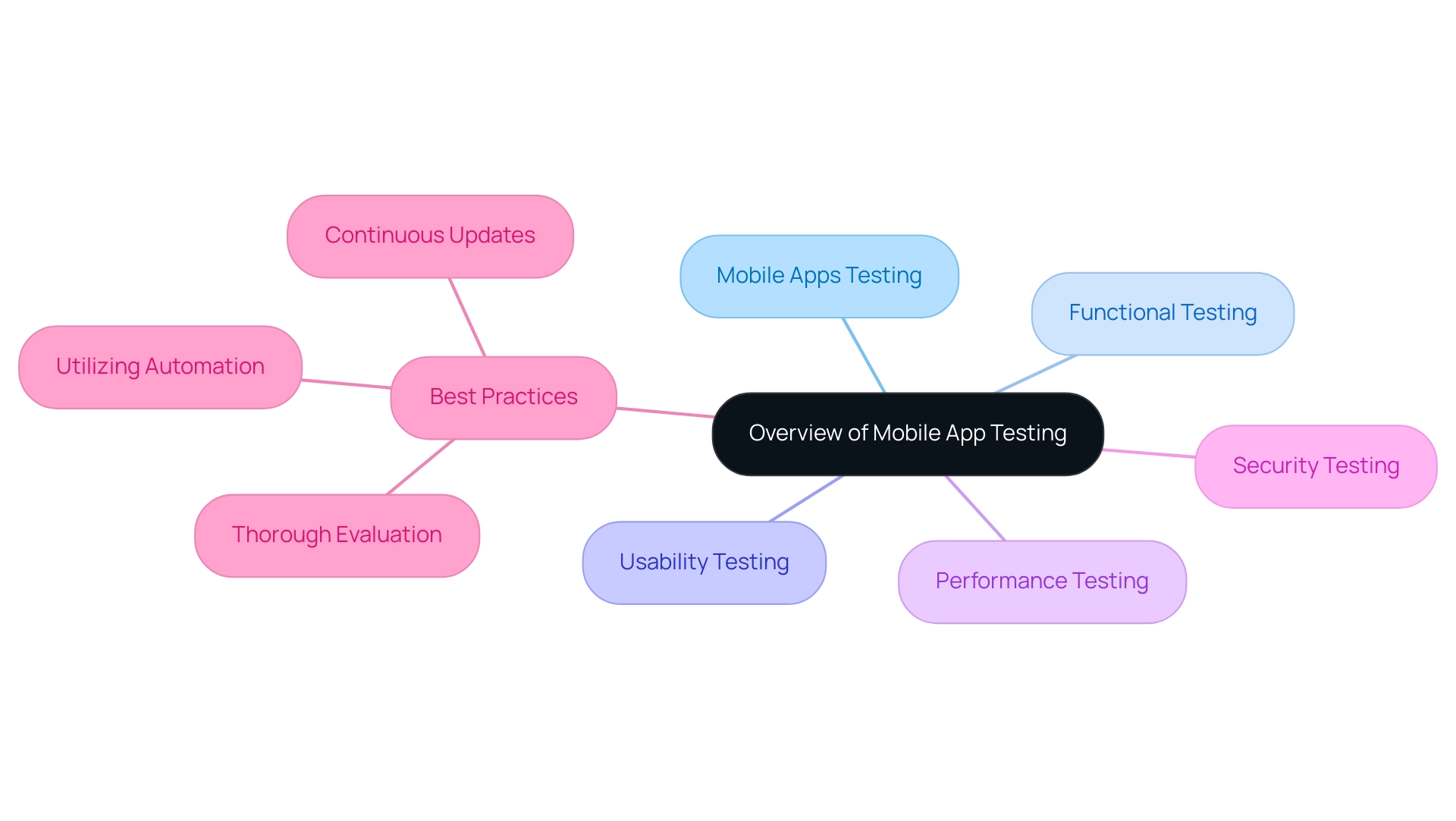
The Importance of Mobile App Testing for Business Success
The importance of mobile apps testing cannot be overstated, as it has a direct effect on business success through improved client satisfaction and retention. A meticulously tested application reduces the likelihood of crashes, bugs, and performance issues—factors that can lead to unfavorable reviews and diminished download rates. Research indicates that an alarming 77% of individuals are likely to abandon an app after a single negative experience.
Shreya Bose, a community contributor, highlights the urgency of these concerns by noting that the average mobile individual checks their smartphone a staggering 47 times a day, underscoring the need for seamless app interactions. Moreover, companies that emphasize thorough evaluation through mobile apps testing not only enhance their brand reputation but also increase audience engagement, ultimately resulting in substantial revenue growth. For example, food & drink applications have a day 1 retention rate of just 13%, illustrating the challenges in maintaining interest.
Additionally, the APAC region consistently outperforms other regions in retention rates, emphasizing the importance of geographical factors in app success. In fact, with 75% of companies relying on their app for at least a quarter of their revenues, neglecting mobile apps testing can yield substantial financial setbacks and tarnish a company's credibility. The case study titled 'Importance of App Quality for Revenue' further illustrates this point, demonstrating that effective evaluation enhances experiences and reduces uninstall rates, as shown by Testlio's services supporting over 1 billion individuals.
Therefore, the connection between application performance and client retention is evident: efficient mobile apps testing is crucial for sustaining competitiveness and nurturing enduring customer loyalty.
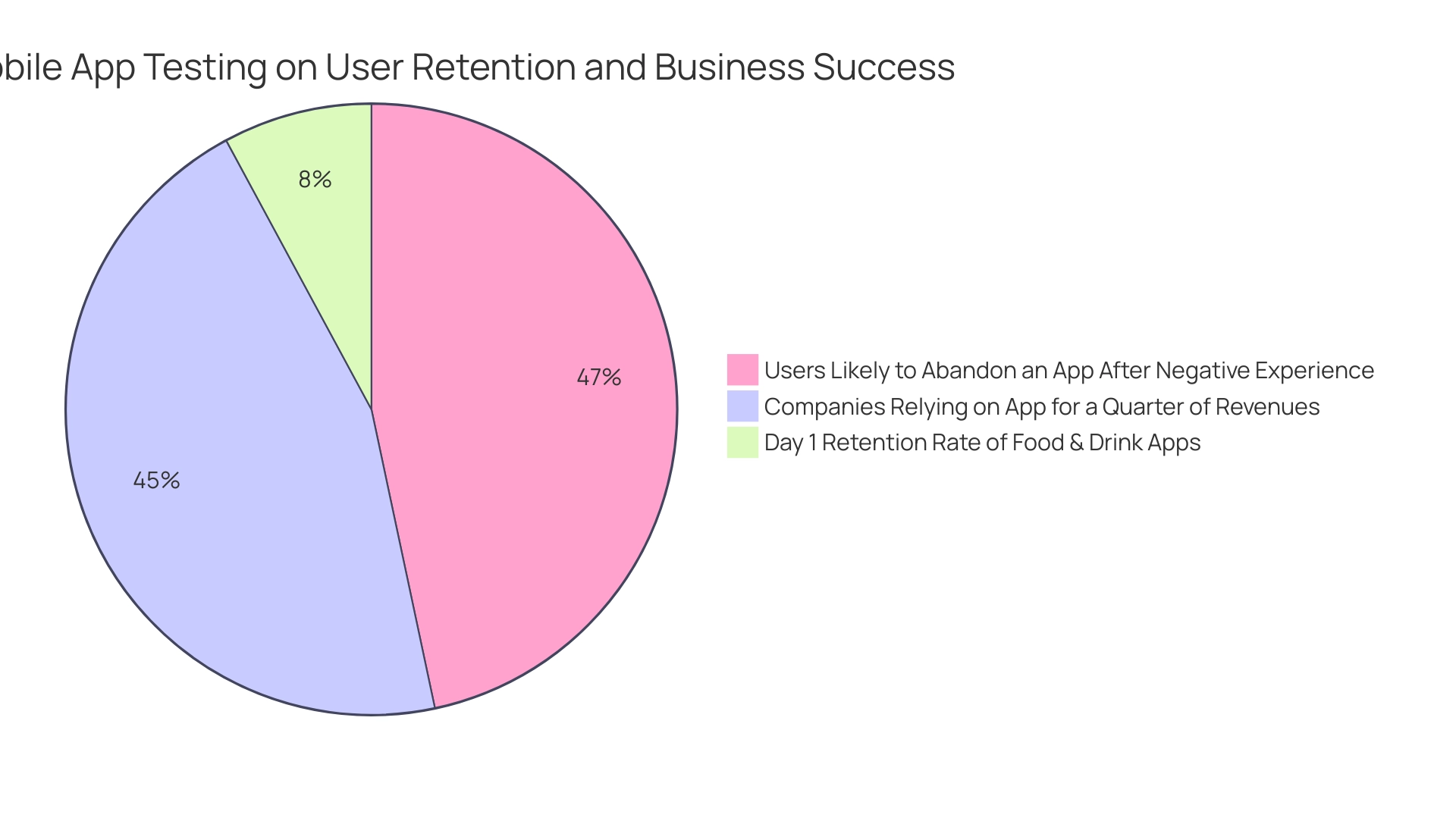
Types of Mobile Apps and Their Testing Strategies
Mobile applications can be categorized into three main types: native, web, and hybrid, and mobile apps testing is essential for determining the unique evaluation strategies required to ensure optimal performance and satisfaction.
-
Native apps, such as WhatsApp, Instagram, Uber, Spotify, and Google Maps, are designed specifically for platforms like iOS or Android. These mobile apps testing procedures require rigorous device-specific evaluations to confirm compatibility and performance, especially given their reliance on device resources and behavior during interruptions.
-
Web applications, reachable through different browsers, require evaluation across various web browsers and screen sizes to ensure a seamless experience for users irrespective of their device.
-
Hybrid apps, which combine features from both native and web applications, necessitate a comprehensive evaluation strategy for mobile apps testing. This encompasses functional evaluations and compatibility assessments as part of mobile apps testing to tackle the complexities inherent in hybrid development.
Insights from the case study 'Testing Considerations for Native and Hybrid Apps' emphasize the significance of a unified evaluation approach that encompasses mobile apps testing along with these key assessment areas. Additionally, TestFairy offers real-time evaluation and monitoring features that enhance mobile apps testing, reinforcing the need for effective assessment methodologies. By adopting customized evaluation methodologies for each app type, mobile apps testing allows developers to proficiently identify and rectify issues before launch, thus enhancing user experience and minimizing post-launch challenges.
As highlighted by industry specialists, without adequate evaluation, 'sketchy' websites may encounter several issues after launch, underscoring the vital importance of these assessment strategies.
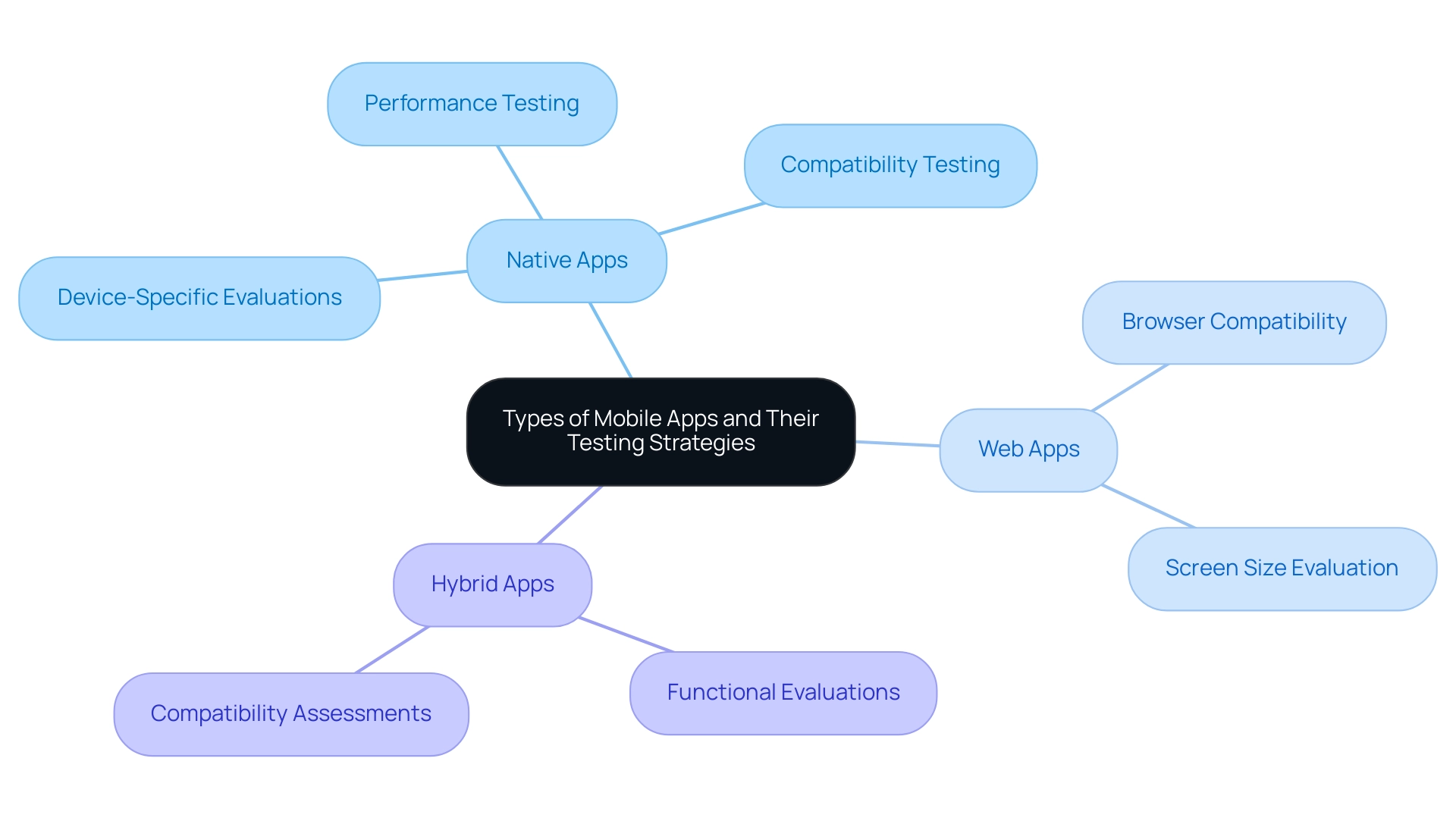
Challenges in Mobile App Testing: Navigating Common Obstacles
Mobile apps testing is fraught with challenges, primarily due to the extensive variety of devices and operating systems in use today. This diversity complicates mobile apps testing significantly, making it essential for developers to ensure their applications function seamlessly across different platforms. An astonishing 50% of apps with five to ten million downloads have security weaknesses, emphasizing the need for strong verification protocols.
The demographics of software testers reveal a diverse workforce, with a majority holding Bachelor's degrees and over 37% being female, which can influence evaluation perspectives and approaches. Striking a balance between manual and automated evaluation is another hurdle in mobile apps testing; manual assessment offers valuable human insights into usability, while automated processes enhance efficiency and coverage. Device fragmentation exacerbates these issues, as applications must maintain optimal performance across various screen sizes and hardware specifications.
Additionally, sensitive data should be encrypted and stored securely using Keychain for iOS or Keystore for Android, addressing critical security vulnerabilities. To effectively navigate these challenges, developers can leverage cloud-based platforms that support mobile apps testing, providing access to a comprehensive range of devices and environments, ensuring thorough evaluation and enhanced application reliability. As highlighted by Forrester, every $1 spent on user experience yields $100, emphasizing the significance of quality evaluation in app development.
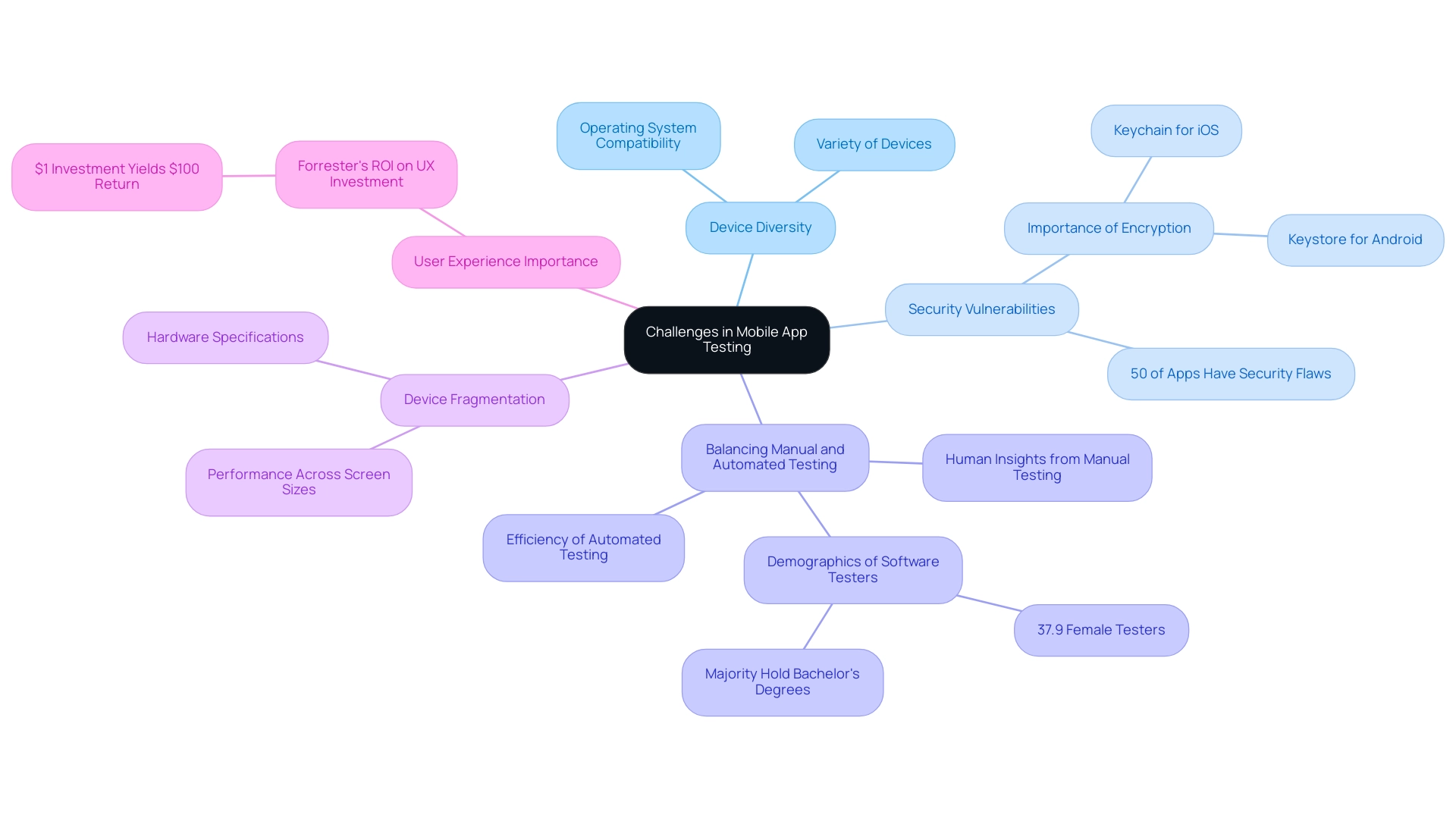
Best Practices for Effective Mobile App Testing
Implementing effective mobile apps testing requires adherence to several best practices that align with the evolving demands of the digital landscape. Central to this is the establishment of a clear evaluation strategy that reflects the app's objectives, ensuring that assessment efforts are focused and relevant. User feedback plays a pivotal role in this process; integrating insights from users not only enhances usability but also significantly boosts app success rates.
According to Business Research Insights, the global Software Testing Market is projected to grow at a compound annual growth rate (CAGR) of 21.71%, highlighting the increasing focus on quality assurance in software development. This growth highlights the necessity for businesses to adopt effective evaluation strategies. Utilizing automated testing tools enhances both efficiency and accuracy, allowing teams to cover more ground in less time.
Furthermore, staying current with the latest devices and operating system updates is crucial for maintaining consistent app performance. As the typical smartphone owner checks their device 47 times a day, ensuring that applications function reliably in this competitive environment is essential. Furthermore, monitoring key performance indicators (KPIs) such as:
- Client acquisition
- Engagement
- App store ratings
is essential for assessing application performance.
By adhering to these optimal methods, companies can develop applications that not only fulfill client expectations but also succeed in an increasingly challenging marketplace. Ultimately, mobile apps testing is crucial for enhancing user experience and identifying potential app issues before they impact users.
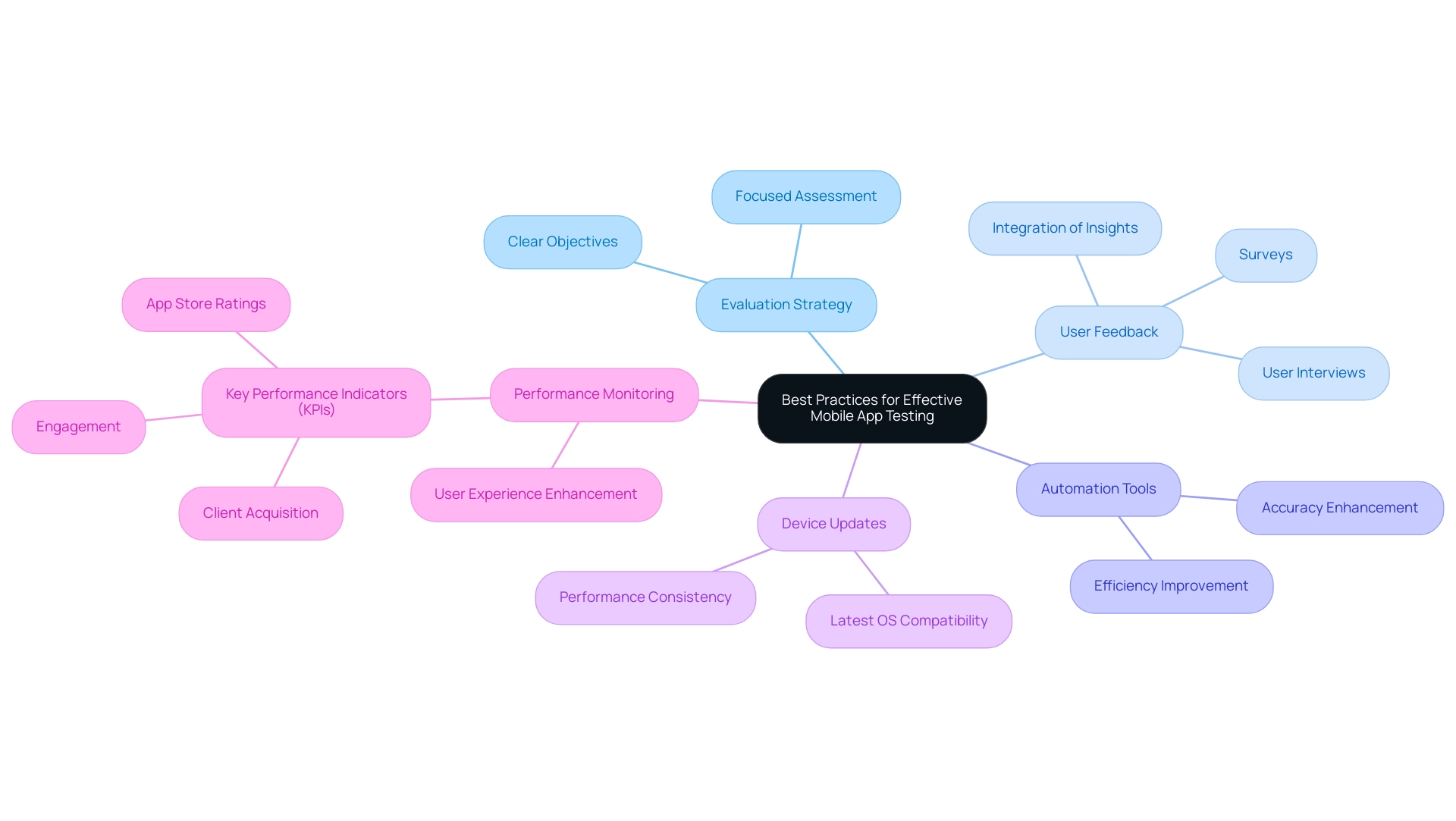
Conclusion
The significance of mobile app testing is undeniable, as it serves as the foundation for delivering high-quality applications that meet user expectations. By employing a robust testing strategy that encompasses:
- Functionality
- Usability
- Performance
- Security
developers can ensure their applications perform optimally across diverse devices and operating systems. The variety of app types, including native, web, and hybrid, necessitates tailored testing approaches that address the unique challenges each type presents.
Moreover, understanding the challenges inherent in mobile app testing—such as device fragmentation, security vulnerabilities, and the balance between manual and automated testing—allows developers to devise effective solutions. Leveraging cloud-based testing platforms can enhance reliability and ensure comprehensive coverage, ultimately safeguarding user experience and retention.
In a landscape where users are quick to abandon poorly performing apps, adhering to best practices is essential for success. By integrating user feedback, utilizing automated tools, and staying abreast of technological advancements, businesses can create applications that not only engage users but also foster loyalty and drive revenue. As the demand for seamless mobile experiences continues to grow, prioritizing mobile app testing will remain a critical component of any successful development strategy.





